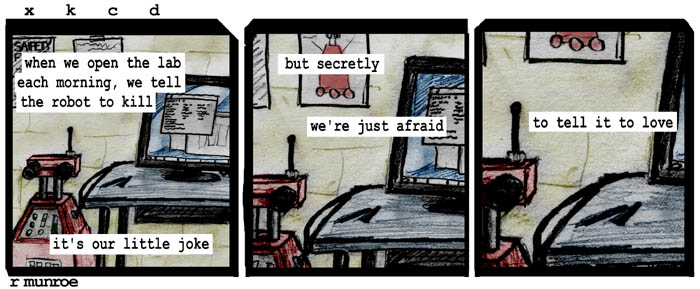Thoughts on rapid breakout in AI over the mid term
Posted: Wed Jan 26, 2011 1:03 am
I was thinking over some of my assumptions on the movement to the upside in AI over the next 30 years, and realized I'd missed something. So I'm putting it up here to see what others see that I'm still missing.
The IBM approach to AI is currently a brute force approach, as John has pointed out several times over the last year or so. This is the only approach we've been able to make work in a general sense (outside very limited areas such as games, etc) over time. The best "real" AI just isn't very smart.
However, I came to realize there is something else here that I've ignored. The brute force AI's will eventually be smart enough (probably in the next five or six years, at most) to design new algorithms, at first with human direction, later as independant autonomic systems.
If we assume there ARE better algorithms for AI than simple brute force, then the brute force AI algorithm designers will eventually find them.
Running such algorithms on machines powerful enough to discover them by brute force will result in an improvement in performance that's indescribable in the usual terms. It's more like an immediate jump in computing power on the order of ten to 100 to one, over a period of a few days or weeks (perhaps minutes if the machines are set up to improve themselves without human intervention). This jump in actual machine intelligence would of course be applied to other problems as well as better algorithms, and that's the essence of the singularity itself - the solution of almost every real world problem on very short timelines. (Whether or not such solutions would be applied in the real world - oh THAT'S a question in itself. And the effects of AI experts on the political process and the manipulation of the public by such - any thoughts?)
But this line of thought indicates the singularity has at least one possible built in quantum leap from one level of capability to a much higher one over a period of time that might be measured in weeks, not years.
Any thoughts on this?
The IBM approach to AI is currently a brute force approach, as John has pointed out several times over the last year or so. This is the only approach we've been able to make work in a general sense (outside very limited areas such as games, etc) over time. The best "real" AI just isn't very smart.
However, I came to realize there is something else here that I've ignored. The brute force AI's will eventually be smart enough (probably in the next five or six years, at most) to design new algorithms, at first with human direction, later as independant autonomic systems.
If we assume there ARE better algorithms for AI than simple brute force, then the brute force AI algorithm designers will eventually find them.
Running such algorithms on machines powerful enough to discover them by brute force will result in an improvement in performance that's indescribable in the usual terms. It's more like an immediate jump in computing power on the order of ten to 100 to one, over a period of a few days or weeks (perhaps minutes if the machines are set up to improve themselves without human intervention). This jump in actual machine intelligence would of course be applied to other problems as well as better algorithms, and that's the essence of the singularity itself - the solution of almost every real world problem on very short timelines. (Whether or not such solutions would be applied in the real world - oh THAT'S a question in itself. And the effects of AI experts on the political process and the manipulation of the public by such - any thoughts?)
But this line of thought indicates the singularity has at least one possible built in quantum leap from one level of capability to a much higher one over a period of time that might be measured in weeks, not years.
Any thoughts on this?
